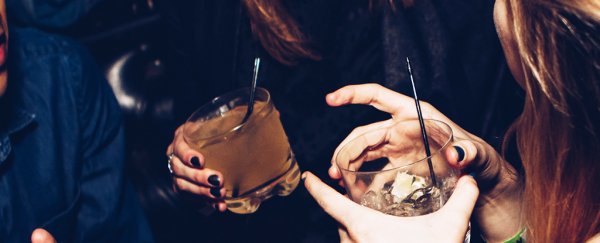Take a quick tipple and you could find yourself speaking a second tongue more naturally, according to new research.
The foreign language skills of participants in the study were found to be improved after a drink of alcohol, which suggests the way booze can put us at ease outweighs the negative effects on our brain – at least for the first drink, anyway.
The international team of researchers is warning against reading too much into their experiment, but it could reveal some interesting insights into the anxiety associated with speaking another language, and how alcohol can help us overcome it.
"Our study shows that acute alcohol consumption may have beneficial effects on the pronunciation of a foreign language in people who recently learned that language," says one of the team, Inge Kersbergen from the University of Liverpool in the UK.
The study involved 50 native German speakers studying Dutch at a Dutch university, who had recently learned to speak, read, and write in the new language.
Based on random selections, participants were either given alcohol or water as a control beverage. The amount of alcohol varied based on body size, but was the equivalent of just under a pint (460 millilitres) of 5 percent beer for a 70 kg (154 lb) male.
They then chatted to a researcher for five minutes, before an audio recording was assessed by two native Dutch speakers who weren't told whether alcohol had been consumed or not. The participants were also asked to rate their own Dutch language skills over the course of the chat.
While the alcohol didn't affect how the students rated themselves, those people who had been given the alcoholic drink were given better ratings by the observers, especially for their pronunciation.
So what's going on? We know that alcohol has a detrimental effect on our brain's executive functioning, including our memory, our attention, and our inhibitions. A lot of these functions are important for speaking a non-native language.
At the same time, we know that booze also improves confidence and reduces social anxiety, which is also helpful when you're trying to talk in another tongue, especially if you've only just learned it.
"One possible mechanism could be the anxiety-reducing effect of alcohol," says one of the researchers, Jessica Werthmann from Maastricht University in the Netherlands. "But more research is needed to test this."
With only 50 people involved in the research, we should be wary of making too many generalisations on this study alone, but it's an interesting pointer towards how a little bit of drink could grease the wheels as far as talking in a foreign language is concerned.
As pronunciation was particularly highlighted as being improved, perhaps a limited amount of booze encourages us to really go for those unfamiliar sounds and mouth movements and not hold back.
"It is important to point out that participants in this study consumed a low dose of alcohol," adds one of the team, Fritz Renner from Maastricht University. "Higher levels of alcohol consumption might not have beneficial effects on the pronunciation of a foreign language."
In other words, this effect probably doesn't get better if you just keep on drinking – eventually no one will be able to understand you at all.
The research has been published in the Journal of Psychopharmacology.
